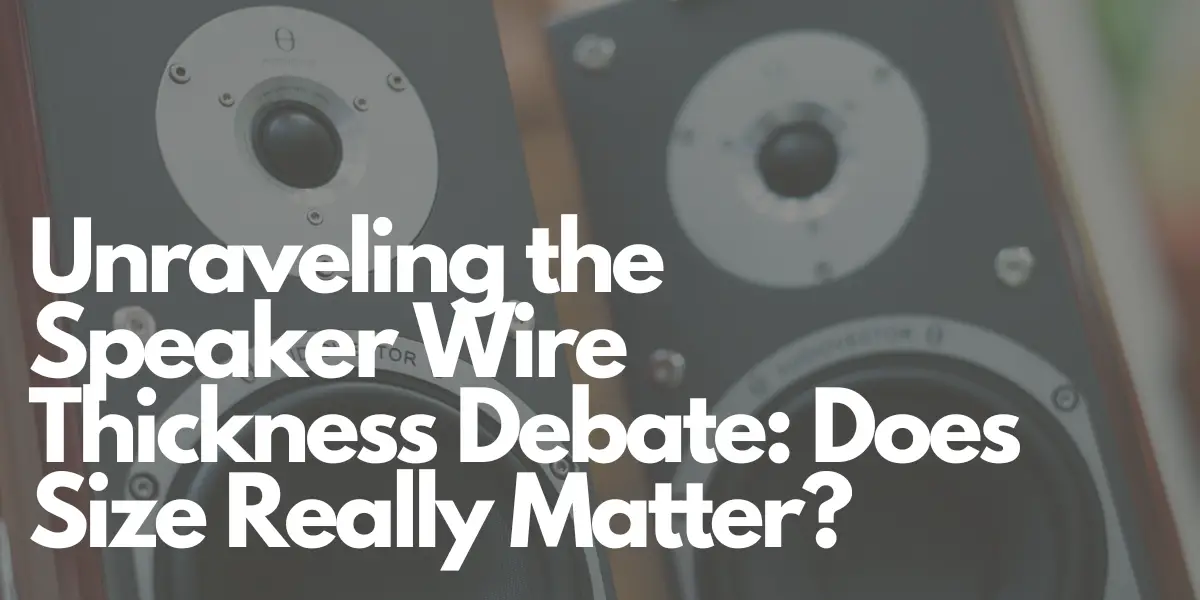In the vast world of audio equipment, the nuances often lead to heated debates amongst audiophiles. One such debated detail is the thickness of speaker wires and its alleged impact on sound quality. As we embark on this exploration, we’ll uncover the truths and misconceptions surrounding speaker wire thickness, helping you make informed decisions for your audio setup. Dive in as we unravel whether size genuinely impacts the sound or if it’s all just a lot of noise.
Understanding Speaker Wire
Speaker wire is a vital component in transmitting electrical signals from your amplifier or receiver to your speakers. These wires are predominantly made from metals like copper or aluminum. Their thickness is commonly indicated using the American Wire Gauge (AWG) system – with a lower AWG number signifying a thicker wire.
The Thickness Myth
There’s a prevalent belief that the girth of a speaker wire directly correlates with sound quality. This idea stems from the notion that a beefier wire offers decreased electrical resistance, theoretically paving the way for enhanced power transmission and thus a better audio output.
Debunking the Thickness Myth
The relationship between speaker wire thickness and sound quality isn’t as straightforward as some might suggest. Here are essential aspects to note:
- Resistance vs. Length: Resistance in speaker wires is more about length than thickness. Extended wire lengths can increase resistance and possibly result in signal degradation. Although thicker wires can alleviate such issues, for many typical home audio systems, the disparity in performance due to wire thickness is minor.
- Speaker Impedance: The impedance of a speaker, measured in ohms, determines how it interacts with cable resistance. Speakers with high impedance aren’t significantly impacted by cable resistance, but those with lower impedance might be more so. Even then, wire thickness is just one of many factors that play into this.
- Audible Differences: Real-world tests have often shown that, for most people, distinguishing sound quality differences between various wire gauges is a challenge, particularly if the wires are not excessively long.
- Practical Considerations: Going overboard with wire thickness can be impractical and pricier. Such wires may not even fit some connectors or speaker terminals comfortably.
- Quality of Materials: Instead of zeroing in on thickness alone, it’s wiser to evaluate the material’s quality. Wires made from high-grade copper or oxygen-free copper can provide superior conductivity and longevity.
When Thickness Matters
While the average listener might not discern differences due to wire thickness, there are specific scenarios where it does count:
- Long Cable Runs: If your sound system setup demands unusually long cable lengths, like in expansive outdoor settings or big halls, opting for thicker wires can be advantageous to reduce resistance.
- High-Power Applications: For systems with powerful amplifiers and speakers with low impedance, thicker wires can be crucial to curtail signal loss and ensure power gets delivered efficiently.
- Personal Preference: Some audio enthusiasts lean towards thicker wires either for peace of mind or as a strategy in their quest for perfect audio quality.
Conclusion
It’s time we put the speaker wire thickness myth to bed. While it holds some significance, various factors such as cable length, speaker impedance, and material grade also play pivotal roles in the audio experience. For many, a standard gauge, quality speaker wire suffices. Instead of obsessing over wire thickness, focusing on aspects like room acoustics, component quality, speaker positioning, and proper calibration will bring about a more immersive audio experience.
Author: Mike P
Hi! My name is Mike! I’ve been an apartment producer/musician for 10+ years. I’ve played in punk bands, released EDM tunes on Beatport and iTunes, and have a semi-successful stock music portfolio. Read more…



